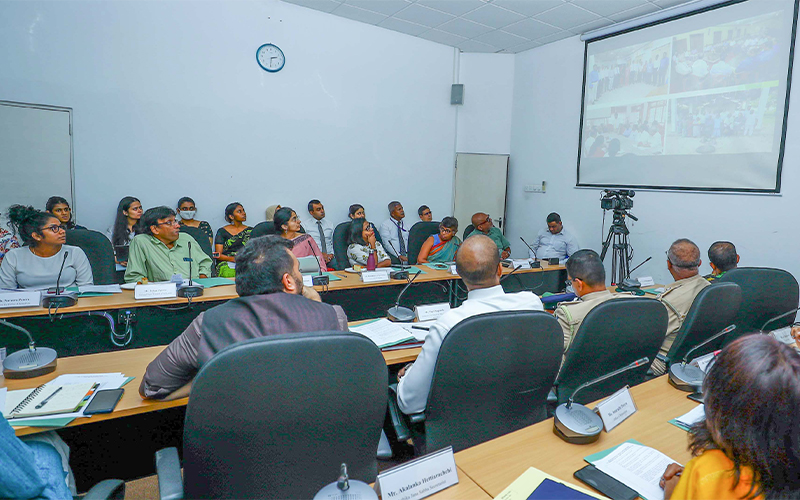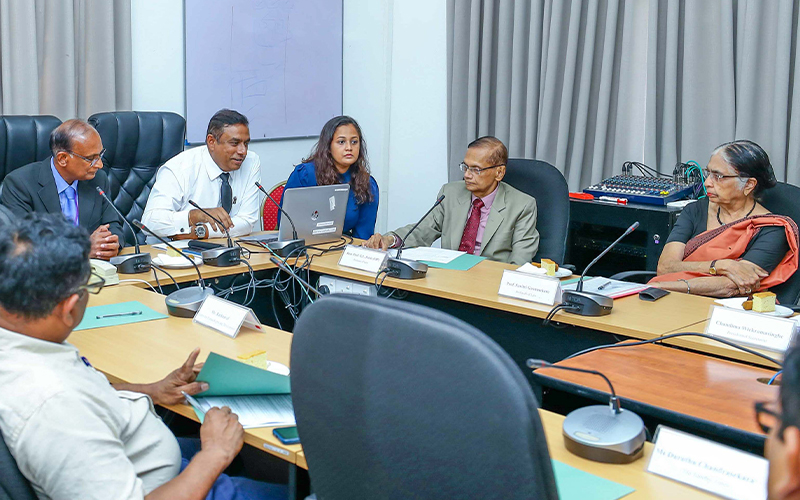.jpg)
(Image courtsey: President Media Division)
Despite criticism from Tamils across the North-East and international organisations, Sri Lanka’s much criticised ‘Truth and Reconciliation’ Commission held a forum in the South last week, with the participation of Colombo-based civil society organisations and journalists.
Sri Lanka’s Interim Secretariat for Truth and Reconciliation Mechanism (ISTRM), yet another government initiative that has been slammed by Tamil survivors as another move to delay international justice, reportedly met with “stakeholders” and “discussed various aspects of the draft bill for a Commission for Truth, Unity, and Reconciliation (CTUR), which will play a pivotal role in addressing grievances of persons affected by the conflict in the North and East, promote reconciliation and non-recurrence,” according to a release by the President Media Unit.
It did not state whether any victim-survivor communities from the North-East, including Tamil families of the disappeared who for years have been demanding an international mechanism, were present or even invited.
Several Colombo-based “civil society representatives, media personnel and experts in the field of law and transitional justice” were present, the government added. the involvement of the Tamil diaspora in the transitional justice process.”
The CTUR was issued in the Gazette on January 1, 2024.
The bill has been slammed by Tamils across the North-East and around the world, who for decades have demanded an independent international mechanism to obtain justice for mass atrocities.

In a recent interview, Tamil National People’s Front (TNPF) leader Gajendrakumar Ponnambalam told the Tamil Guardian the CTUR is "a joke".
“The Secretary to the President invited all of the sorts of Colombo-based civil society, actors, organisations and activists and had a pretty lengthy meeting with regards to how the government proposed to handle reconciliation and accountability, and bluntly stated that their efforts towards the creation of a TRC are to ensure that criminal accountability goes out,” said Ponnambalam.
“So it's quite clear that the intention is to establish a so-called pretend reconciliation mechanism as an alternative to accountability. It is not a complimentary thing. So there is no incentive for the truth to come out - it is a whitewash.”
Meanwhile, the TGTE (Transnational Government of Tamil Eelam) points to a series of commissions from 1977 to 2006, each yielding minimal results for victims and raising questions about the sincerity of Sri Lanka's commitment to justice.
The TGTE argues that a crucial component for lasting peace is the acknowledgement of responsibility and recognition of victims' suffering. Drawing parallels with post-war Germany and Sadat's acknowledgement of Jewish suffering, the TGTE contends that Sri Lanka's failure to make a genuine acknowledgement raises doubts about its intent to implement recommendations for justice or recompense.

The criticism has not been just from Tamils. Last year Human Rights Watch (HRW) said the government initiative “is not a serious step to obtain truth or justice for past international crimes.”
In a report “If We Raise Our Voice They Arrest Us’ released by Human Rights Watch in September 2023, 80 interviews with relatives and victims of enforced disappearances showed that the government had not consulted with victims in the past.
A relative of a forcibly disappeared person told the HRW that there “are so many commissions”.
“They came to the villages, met the people, and they wrote a report. All those reports are sleeping in their storeroom. Those are the true stories of the families. Some of them [family members] have already died. We have given all the truth and evidence already to all those.”
We need your support
Sri Lanka is one of the most dangerous places in the world to be a journalist. Tamil journalists are particularly at threat, with at least 41 media workers known to have been killed by the Sri Lankan state or its paramilitaries during and after the armed conflict.
Despite the risks, our team on the ground remain committed to providing detailed and accurate reporting of developments in the Tamil homeland, across the island and around the world, as well as providing expert analysis and insight from the Tamil point of view
We need your support in keeping our journalism going. Support our work today.
For more ways to donate visit https://donate.tamilguardian.com.

